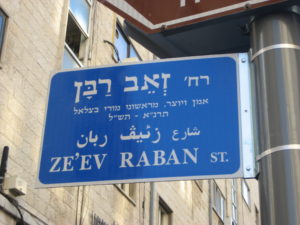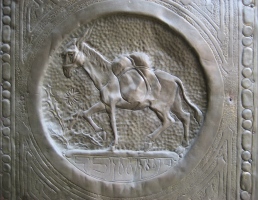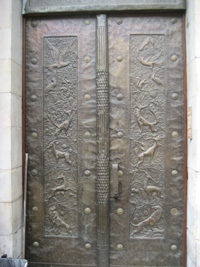The word Vayechi in Hebrew means “And he lived” and this is the twelfth Parasha in the annual Jewish cycle of the Torah reading. Here we read about Jacob, who is laying on his deathbed in the land of Goshen in Egypt and thus he calls for his son Joseph. In this occasion Jacob adopted Joseph’s sons Ephraim and Menashe as his own sons and blessed them. Jacob found himself immersed in deep thought and self examination. He thought of his beloved wife Rachel and made a confession:
“When I was returning from Paddan, to my sorrow, Rachel died along the way, some distance from Efrath in the land of Canaan. I buried her there along the way to efrath” (Genesis 48:7).The same Jacob who has striven with god and with man (Genesis 32:29), Jacob who was involved in great deeds thinks on his deathbed of his wife who died so young. The bible is not generous with words and instead we turn to Rashi who emphasizes the agitated state of Jacob. The words of Rashi were written with minor changes as a poem by Shimshon Meltzer “I will sing for Rashi”:
“… and I – I Jacob, When I came – came from Paddan – Paddan AramDied – Passed away – deceased because of me – Rachel, your mother…And though I make you take me and bury me in the land of Canaan,
And I failed to do so for your mother… and I know you bear a grudge against me…”
The first time I encountered Meltzer’s poem (who was Berl Katzenelson’s partner In “Davar” a Hebrew-language daily newspaper published in the Mandate Palestine and Israel between 1925 and May 1996) was when I read Haim Sabato’s book “From the four winds”. Like the author of the book I also “…felt a kind of pleasantness. The words, the lines, the periods and the memories stirred inside me, whirled my thoughts and reminded me more and more pictures” (Haim Sabato, “From the four winds”, p. 76) and who won’t shed a tear after reading this interpretation of Jacob’s words? Jacob in his last days and moments is a sensitive sad man who lived for many years with a personal tragedy that never left him from the day it happened. I feel it is one of the saddest verses in the bible. I feel the shadow of this verse every time I read the Parasha of Vayechi. It gives a different and more significant meaning to Jacobs blessing to his sons, the blessing which is the heart of the Parasha of Vayechi. It is hard to find any reference for Jacob’s sorrow but his blessing is well mentioned. One of the best examples is situated in “Bikur Cholim” hospital near the crossroads of Strauss and Hanevi’im st. in Jerusalem. The western building entrance doors depict the signs of the twelve tribes and according to tradition they show motifs mentioned in Jacob’s blessing in the Parasha of Vayechi. The brass doors are the handiwork of one of the most important artists who lived and worked in Jerusalem during the 1920’s. The artist, who graduated from Bezalel Academy of arts is Ze’ev Raban. Raban was influenced by the stories of the bible and embedded many biblical motifs in his works. Among his works are the capitals of the pillars in the Y.M.C.A building in Jerusalem. These capitals predictably show many biblical motifs. They were made to the order of the Architect Arthur Loomis Harmon who took part in the building of the Empire state building in New York. It seems it was only natural that Ze’ev Raban will get a street named after him.
Ze’ev Raban’s Brass doors show twelve squares, one for each Israeli tribe. The square dedicated to Zebulun shows a ship at the heart of the ocean, reminding us the verse “Zebulun will live by the sea shore and will be a harbor for ships, and his territory will be next to Sidon…” (Genesis 49:13), Issachar is showed as “…a strong donkey lying down between the saddlebags” (Genesis 49:14) and Asher who was blessed with “…food will be rich and he will produce royal delicacies” (Genesis 49:20) gets a bowl full with fruit in Raban’s work. A similar graphic description can be found in a series of postal stamps issued on the 8.11.1955 and designed by G. Hamori. We can see that the stamps shown in the attached picture show the symbol of each tribe according to Jacob’s blessing.
Ze’ev Raban’s “tribal doors” were placed in “Bikur Cholim” when the hospital moved out of the old city of Jerusalem to its present location in 1925 (The hospital was founded by the “Bikur Cholim” organization in the old city of Jerusalem in 1857. The building of the new hospital started in 1910 and was finished only 15 years later). One day I was guiding a group who took special interest in the subject. While standing in front of the doors I could see that the guard standing at the entrance never heard this story before. We spoke for a short while and I told him briefly the story of the place. It was very moving to see a new light in his eyes – for a moment he forgot his daily routine and found himself connected again to a different more spiritual Jerusalem. That was another proof that the Parasha of Vayechi is of importance to each and every one of us.



